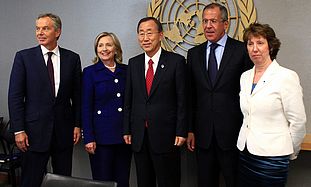
Israel Omen - Those who touch Israel will be cursed... [Zec 12:3] "On that day, when all the nations of the earth are gathered against her, I will make Jerusalem an immovable rock for all the nations. All who try to move it will injure themselves." [Psa 83:1-18] Events listed here as a result of wrong choices...
The Israel Omen “Dividing the Land” Blog powerfully reports a series of historically destructive events since 1991 to current, connected by a common thread: warnings found in Ancient Hebrew prophetic Scripture that Israel was not to be divided. Are these events the telling signs of an ancient Divine Omen, the same omen ignored by the Egyptians 3,500 years ago as Moses was leading the children of Israel out of Egypt by YHVH's mighty hand?
This Blog presents strong evidences that the "Four Horns" foretold in Zechariah 1:18-21 to be scattering Judah, Israel, and Jerusalem are the four nations of the "Quartet"!
The Israel Omen website and Book by David Brennan
Friday, 22 March 2013
20 March 2013 Obama calls for dividing Israel
Saturday, 29 October 2011
Friday, 28 October 2011
28/10/11 - Israel ready to submit borders proposal to Quartet
 Breaking from previous position, J'lem willing to come forward with comprehensive plan within three months; follows Blair meeting.
Breaking from previous position, J'lem willing to come forward with comprehensive plan within three months; follows Blair meeting.
In a departure from previous policy, the government has agreed to put forward a comprehensive proposal on borders within three months, according to a Quartet communiqué issued on Thursday.
The statement, put out following separate meetings the Quartet envoys and Quartet representative Tony Blair held in Jerusalem with Israeli and Palestinian officials on Wednesday, said the parties agreed with the Quartet to “come forward with comprehensive proposals on territory and security within three months.”
Prime Minister Binyamin Netanyahu has been reluctant to present a detailed map of where he envisions a future Palestinian state, wary of revealing a key negotiating card before knowing what he can expect in return from the Palestinians on issues such as refugees, Jerusalem and recognition of a Jewish state.
Blair, in an interview he gave earlier this week with the Los Angeles Times, was asked whether either side has provided the Quartet with a detailed proposal on borders and security.
“The Palestinians, of course, did table a proposal in the last talks that they had in Annapolis [Maryland, in 2008 during the Bush administration].
They were detailed, significant proposals on borders at least, in and around land swaps.
This Israeli government has not produced such a proposal, and that’s obviously one thing we have to explore with them,” he said.
One Israeli government official, when asked about Israel’s border proposals, said Jerusalem wanted to “facilitate” the Quartet’s efforts to launch direct negotiations without preconditions. He stressed, however, that it was important that the Quartet meetings don’t become a substitute for direct negotiations between the sides, but only as a way to get those talks started.
Blair explained in his interview that the Quartet was trying to get detailed proposals from Israel and the Palestinians on borders and security, to gauge how wide the gaps were, and whether there was a basis for negotiation.
The Quartet reiterated in its statement that the objective of the current efforts is “direct negotiations leading toward an agreement by the end of 2012.” The statement said that the envoys would meet regularly with the sides over the next 90 days to review progress.
The statement also reiterated the Quartet’s call for the parties to “refrain from provocative actions” so the negotiations can be effective, diplomatic code for Israel to stop settlement construction.
Government officials, meanwhile, denied reports of US pressure on Israel to freeze construction now, including in Jerusalem neighborhoods beyond the Green Line, such as the recently approved project in Gilo, to lure the PA back to talks.
Netanyahu, the official said, has made clear that the type of housing-start freeze he implemented in the West Bank, but not in east Jerusalem, at the end of 2009 for 10 months was not going to repeat itself.
A spokesman at the US Embassy in Tel Aviv, when asked if Washington was calling on Israel to freeze settlement construction, said the American position on settlements has been known and consistent for 30 years.
“We consider settlements and construction in east Jerusalem to be actions that appear to be, or actually are, prejudicing the outcomes of negotiations,” he said.
The spokesman said the US “urged both sides to refrain from any sort of unilateral action that would impede the successful outcome of direct negotiations,” and added that the American position was for the resumption of direct negotiations without any conditions.
Thursday, 27 October 2011
27/10/11 - Quartet seeks Israel-Palestinian peace proposals
Sunday, 23 October 2011
23/10/11 - Jordan's king urges restart of Mideast peace talks
Saturday, 22 October 2011
22/10/11 - AMAZING TIMES! Prophecy Being Fulfilled Before Our Eyes? Daniel 11?
Libyan Officials Say Liberation Will Be Declared Sunday
 APOCt. 22, 2011: A Libyan revolutionary fighter returning from Sirte is welcomed at Al Guwarsha gate in Benghazi, Libya.
APOCt. 22, 2011: A Libyan revolutionary fighter returning from Sirte is welcomed at Al Guwarsha gate in Benghazi, Libya.
Read more: http://www.foxnews.com/world/2011/10/22/libyan-official-liberation-to-be-declared-sunday/#ixzz1bYSQT2Rl
